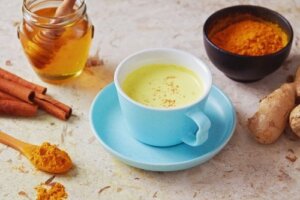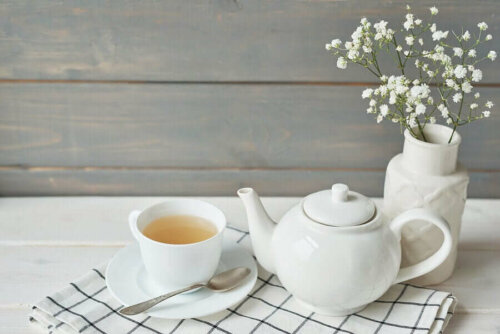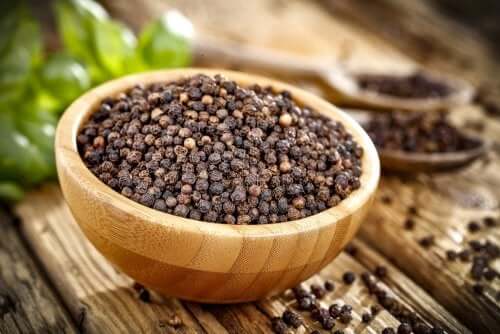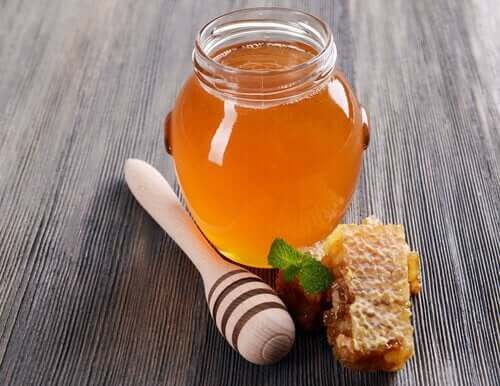How to Fight Off a Cough with Pepper and Honey Tea

Coughing is an uncomfortable symptom that often appears with infections that affect the respiratory system. It’s the immune system’s reaction when being attacked by viruses and bacteria. Did you know that you could fight your cough with pepper and honey tea?
Natural medicine claims that both ingredients reduce the irritation of the bronchial tubes and encourage phlegm expulsion. But is it true? Keep reading to find out.
Fighting off a cold with pepper and honey tea

Fighting off a cough with a pepper and honey tea is said to have interesting benefits. These natural ingredients have been used since ancient times as allies to improve respiratory health. In fact, experts in Ayurvedic medicine often point to their use in flu, colds, bronchitis and other conditions.
Each ingredient can also be used individually to relieve discomfort such as a sore throat, phlegm or chest congestion, among others. However, the true secret is that when you combine them, their benefits are enhanced.
Find out: Use Onions to Fight Coughs Naturally
The benefits of black pepper

Piperine contained in black peppercorns has anti-inflammatory and antioxidant effects used for multiple purposes.
Although all varieties of pepper bring health benefits, in this particular case we suggest using black pepper. It comes from the native Indian plant Piper nigrum, and has been cataloged as “the queen of spices” due to its interesting properties.
An article published in the Journal of Critical Reviews in Food Science and Nutrition explains that the piperine compound in black pepper has anti-inflammatory and antioxidant effects. Thus, this substance helps stop the effects of free radicals on cells and, therefore, prevents chronic diseases from developing.
In addition, scientists believe that its regular intake contributes to the adequate absorption of other nutrients, which is key in strengthening the immune system’s operation. Therefore, it helps the body fight off irritants and pathogens that affect respiratory health.
The benefits of honey

This ingredient has been used since ancient times for its benefits with cough and phlegm.
Honey is one of the most widely-used foods in alternative medicine for the relief of dry and productive coughs. In fact, there’s scientific research that supports its benefits. In fact, a 2010 clinical trial found that honey works better than two drugs commonly used to treat coughs: dextromethorphan and diphenhydramine.
This organic ingredient has antibiotic properties that help treat bacterial infections, according to the findings of the study Honey: its medicinal property and antibacterial activity.
In addition, it is also antiviral and antiseptic, which is key to relieving the symptoms of lung conditions. This study also corroborates that it has anti-inflammatory effects.
For all of these reasons, honey may be one of the best supplements to relieve throat irritation, excess phlegm production, and other symptoms that accompany coughing. Best of all, it’s safe to ingest by both children and adult patients.
Also read: A Stimulating Medicinal Drink for a Cough and Colds
Fighting off a cold with pepper and honey tea

It’s very easy to make this tea.
To fight off a cough with a pepper and honey tea, you simply have to add the two ingredients in water. You can also add lemon and ginger, two ingredients that provide additional cough relief benefits.
For example, the book Herbal Medicine explains that ginger has anti-inflammatory and antioxidant properties, while lemons have an antimicrobial effect.
Ingredients
- 2 cups of water (500 ml)
- 1 teaspoon of recently ground black pepper (5 g)
- Honey (15 g)
- 1/2 a lemon’s juice
- 1 teaspoon of ginger (5 g)
Preparation
- Pour the cups of water into a pot and bring them to a boil.
- When it reaches boiling point, add the teaspoon of black pepper, the lemon juice and the ginger.
- Cover the drink and let it rest at room temperature for 10 minutes.
- Then, strain it with a fine strainer and add the honey.
How to Take
- Divide the drink into 3 portions to take throughout the day.
- Start by drinking a cup of tea on an empty stomach and repeat the dose before the main meals.
- Drink it until your cough is completely under control.
Important! Before fighting off a cold with tea…
Although this cough remedy could be effective, it’s not recommended in some cases. Avoid drinking it if you have intestinal diseases such as Crohn’s disease and irritable colon.
You should also visit a medical expert if you are pregnant, breastfeeding or under any medical treatment. Do not take more than the indicated amount, as excess intake could be harmful.
And of course, last, but not least, if you have any doubts, visit a medical expert before drinking this tea. Remember that if the cough persists over time, you should go to the doctor’s office to confirm that it is not a symptom of a more serious health issue.
All cited sources were thoroughly reviewed by our team to ensure their quality, reliability, currency, and validity. The bibliography of this article was considered reliable and of academic or scientific accuracy.
- Srinivasan, K. (2007). Black pepper and its pungent principle-piperine: A review of diverse physiological effects. Critical Reviews in Food Science and Nutrition. https://doi.org/10.1080/10408390601062054
- Veda, S., & Srinivasan, K. (2009). Influence of dietary spices – Black pepper, red pepper and ginger on the uptake of β-carotene by rat intestines. Journal of Functional Foods. https://doi.org/10.1016/j.jff.2009.10.002
- Rédei, G. P. (2008). Black Pepper (Piper nigrum). In Encyclopedia of Genetics, Genomics, Proteomics and Informatics. https://doi.org/10.1007/978-1-4020-6754-9_1875
- Shadkam, M. N., Mozaffari-Khosravi, H., & Mozayan, M. R. (2010). A Comparison of the Effect of Honey, Dextromethorphan, and Diphenhydramine on Nightly Cough and Sleep Quality in Children and Their Parents. The Journal of Alternative and Complementary Medicine. https://doi.org/10.1089/acm.2009.0311
- Paul, I. M., Beiler, J., McMonagle, A., Shaffer, M. L., Duda, L., & Berlin, C. M. (2007). Effect of honey, dextromethorphan, and no treatment on nocturnal cough and sleep quality for coughing children and their parents. Archives of Pediatrics and Adolescent Medicine. https://doi.org/10.1001/archpedi.161.12.1140
- Oduwole, O., Meremikwu, M. M., Oyo-Ita, A., & Udoh, E. E. (2014). Honey for acute cough in children. Evidence-Based Child Health. https://doi.org/10.1002/ebch.1970
- Bogdanov, S. (2014). Honey Composition. In The Honey Book. https://doi.org/10.1016/j.sjbs.2016.12.010
- Journal Critical Reviews in Food Science and Nutrition. Volume 47, 2007 – Issue 8. Black Pepper and its Pungent Principle-Piperine: A Review of Diverse Physiological Effects. https://www.tandfonline.com/doi/abs/10.1080/10408390601062054?journalCode=bfsn20
- J Altern Complement Med. 2010 Jul;16(7):787-93. A comparison of the effect of honey, dextromethorphan, and diphenhydramine on nightly cough and sleep quality in children and their parents. doi: 10.1089/acm.2009.0311.
- Asian Pac J Trop Biomed. 2011 Apr; 1(2): 154–160. Honey: its medicinal property and antibacterial activity. doi: 10.1016/S2221-1691(11)60016-6
- Pharmacognosy Res. 2017 Apr-Jun; 9(2): 121–127. Honey and Health: A Review of Recent Clinical Research. doi: 10.4103/0974-8490.204647
- Herbal Medicine: Biomolecular and Clinical Aspects. 2nd edition. Chapter 7The Amazing and Mighty Ginger. https://www.ncbi.nlm.nih.gov/books/NBK92775/
- Dhanavade, Dr. Maruti & Jalkute, Dr. Chidambar & Ghosh, Jai & Sonawane, Kailas. (2011). Study Antimicrobial Activity of Lemon (Citrus lemon L.) Peel Extract. British J. of Pharmacology and Toxicology. 2. 119-122. https://www.researchgate.net/publication/236217959_Study_Antimicrobial_Activity_of_Lemon_Citrus_lemon_L_Peel_Extract/citation/download
This text is provided for informational purposes only and does not replace consultation with a professional. If in doubt, consult your specialist.








